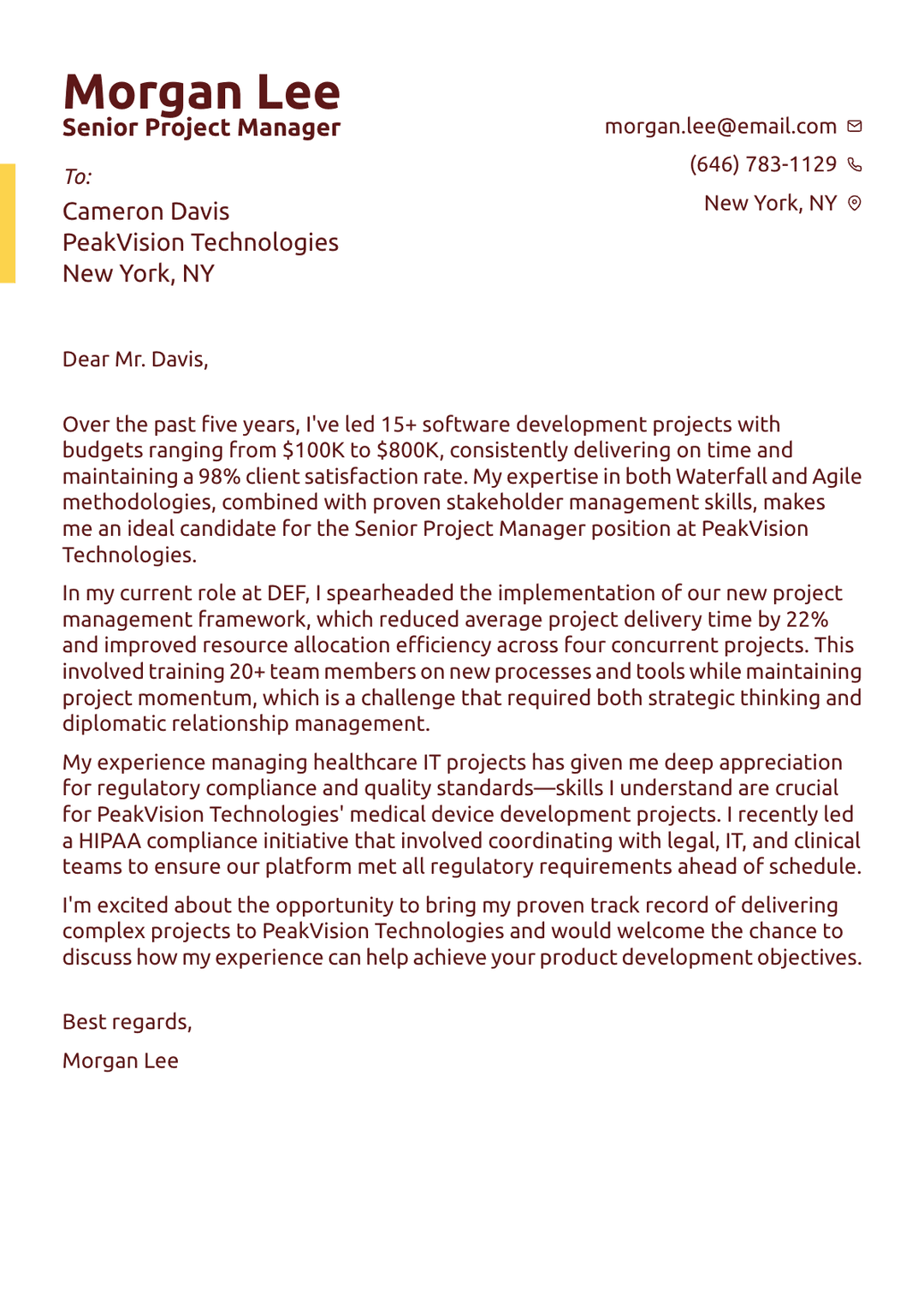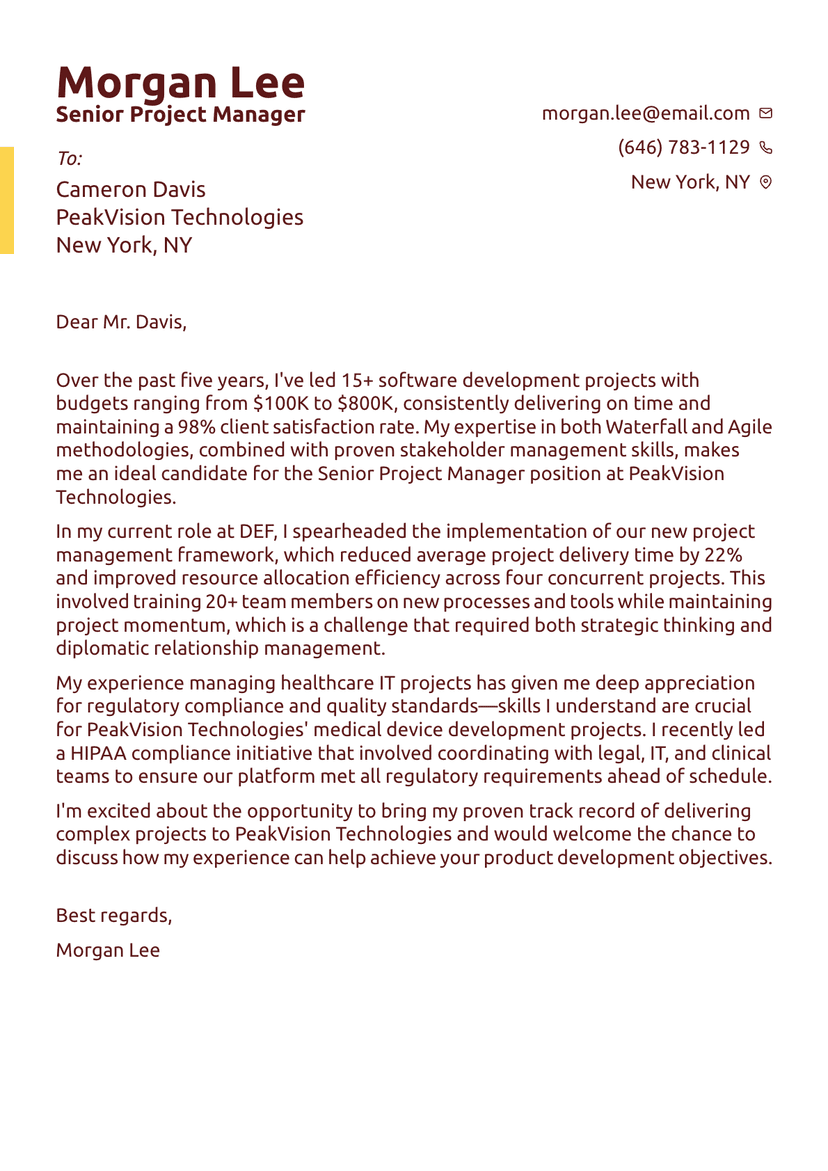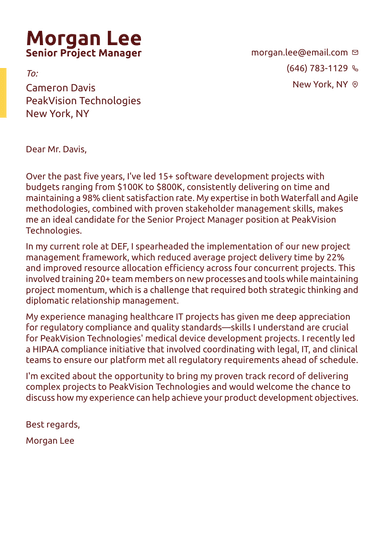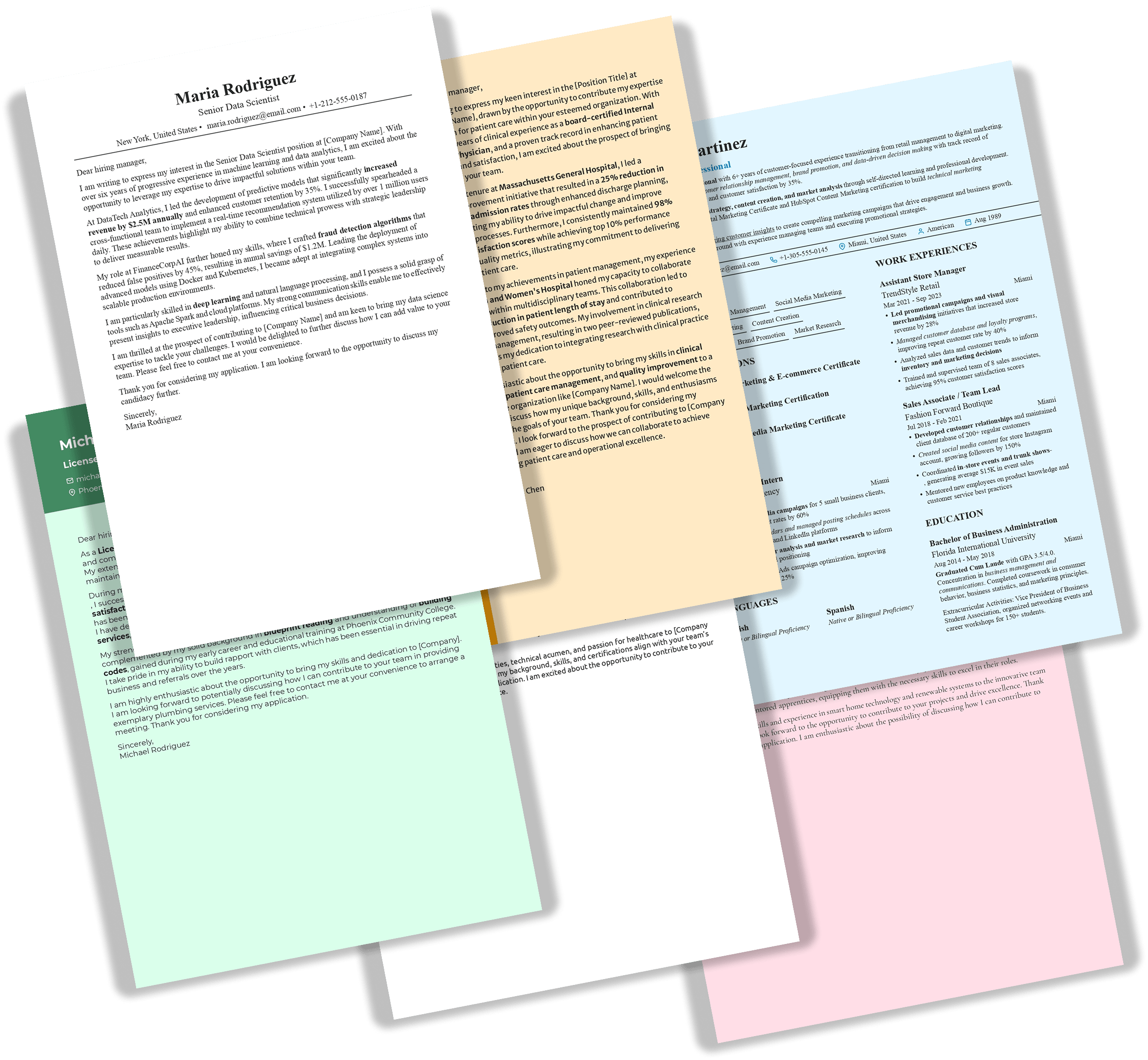Project Manager Cover Letter: Writing Guide (w/ Examples)
This complete guide with expert tips and real examples will teach you how to write a compelling cover letter — fast and stress-free!
Edit this cover letter
A project manager cover letter is a formal document that accompanies your CV and introduces you as a candidate for a project management role. A well-crafted one shows how you’ve successfully planned, executed, and delivered projects, giving employers a glimpse of your management style and professional impact.
In this article, you’ll learn how to write a project manager cover letter that stands out. We’ll break down its key sections, explain what recruiters expect to see in each, and show which skills and achievements deserve the spotlight. You’ll also discover common pitfalls to avoid, expert tips for structuring your message, and examples to help you create a persuasive, polished document.
- A project manager cover letter must go beyond formality and demonstrate leadership, measurable results, and your ability to manage complex initiatives through others.
- Tailoring your cover letter to the company’s challenges, culture, and methodologies is crucial for proving you understand their needs and can deliver relevant solutions.
- Structuring your body paragraphs with the STAR method (Situation, Task, Action, Result) helps you turn past experience into clear, results-driven achievements.
- Highlight core PM skills such as leadership, risk management, stakeholder communication, and budgeting, always with quantifiable examples.
- Avoid generic templates, vague statements, and cluttered formatting; a strong project manager cover letter should be customized, concise, and professionally presented.
Why Is a Project Manager Cover Letter Important?
A project manager cover letter is important because it demonstrates leadership capabilities, quantifiable project outcomes, and cross-functional collaboration skills needed for the role. It also addresses the specific requirements mentioned in the job posting.
Project management cover letters differ significantly from other professional job applications because they must prove you can handle responsibility before you're given it. Unlike technical roles, where skills can be tested, or sales positions, where results speak clearly, project management success depends on your ability to coordinate, manage competing priorities, and deliver results through others.
Therefore, you must submit a cover letter that provides concrete examples of how you've applied these skills in real situations and what you stated on your resume. This means going beyond stating that you "managed projects" to showing how you improved outcomes, solved problems, or created value for previous employers.
The most compelling project manager cover letters tell a story of progression and impact. They demonstrate not just what you've done, but how your approach to project management has evolved and delivered increasingly significant results. Such a narrative approach helps hiring managers envision you growing within their organization and tackling their specific challenges.
Project Manager Cover Letter Examples
Here are three effective PM cover letter examples you can use for your own inspiration:
Entry-Level Project Manager Cover Letter Example
Experienced Project Manager Cover Letter Example
Career Change to Project Management Example
How to Research the Role and Tailor Your Project Manager Cover Letter
To research the role and tailor your project manager cover letter, you should:
#1. Analyze the Job Description
Effective job description analysis goes beyond identifying required skills; it's about understanding the underlying challenges and priorities the organization faces. You should look for clues about their current project management maturity, preferred methodologies, and the types of projects you'd be managing.
Pay special attention to keywords like "Agile transformation," "risk mitigation," "stakeholder alignment," or "budget optimization." These phrases reveal what the hiring manager considers most important. Then, create a mental map of how your experience aligns with each priority, and structure your cover letter to address them systematically.
Also, you should notice what's not mentioned. For example, if a job posting emphasizes technical PM skills but doesn't mention team leadership, they might be struggling with execution rather than people management. If they stress stakeholder communication skills repeatedly, they've likely had issues with project visibility or buy-in.
#2. Develop Company Research Strategies
Deep company research transforms generic applications into compelling narratives. Start with their website, recent press releases, and industry news to understand their strategic direction, recent challenges, and growth initiatives. LinkedIn can reveal team dynamics, recent hires, and organizational changes that might impact the PM role.
Furthermore, look for information about their project management methodology, tools they use, and cultural values they emphasize. If they've recently announced a digital transformation initiative, mention your experience with similar projects; if they value innovation, highlight your track record with experimental or high-risk projects, etc.
This research should teach you not just what to write, but how to write it. A startup might appreciate a more casual, results-focused tone, while an established corporation might prefer a more formal, process-oriented tone.
4 Essential Components of a Project Manager Cover Letter
Now that we know why a project manager cover letter is important and how to prepare for writing one, let’s see what the essential sections of this document are:
#1. Neat Header and Contact Information
Your professional header sets the tone for everything that follows, and it should contain your full name, phone number, professional email address, and LinkedIn profile URL. Many successful project managers also include their city and state (full address isn't necessary) and relevant certifications like PMP or CSM after their name.
Here’s an example of what this section should look like:
Jordan Ellis
jordan.ellis@email.com
(555) 678-2345
Seattle, WA
linkedin.com/jordanellis872
#2. Attention-Grabbing Opening Paragraph
Your opening paragraph must immediately establish your value proposition. Start with your years of PM experience, a significant achievement, and the specific role you're targeting. Avoid generic openers like "I am writing to express my interest", as hiring managers read dozens of these daily.
Let’s see what you can write:
Having spent over seven years managing end-to-end projects in the technology sector, I’ve successfully delivered initiatives worth more than $5M, each completed on time, within scope, and under budget. By leading cross-functional teams of up to 20 members and implementing Agile and Scrum frameworks, I’ve consistently improved delivery efficiency and client satisfaction rates. I’m eager to bring this combination of strategic leadership and hands-on project execution to the Project Manager role at PinaStyle, driving measurable results and sustainable growth.
This approach immediately signals your seniority, quantifies your impact, highlights relevant methodologies, and demonstrates that you've researched the specific position.
#3. Body Paragraphs That Showcase Value
Structure your body paragraphs using the STAR method (Situation, Task, Action, Result) to present your most relevant accomplishments. Each paragraph should address a key requirement from the job posting while demonstrating your problem-solving approach and leadership style.
Additionally, make sure you mention what exactly prompted you to apply for the position in the first place. While researching the company, you can find its missions and values and then match some of your career goals with them to show that you’ve understood what the purpose of their work is.
An example looks like this:
At HershSolutions, I was tasked with rescuing a series of software projects that had fallen behind schedule due to communication gaps and unclear requirements. Recognizing the need for structure, I introduced Agile sprint cycles, clarified deliverables through stakeholder workshops, and established daily stand-ups to keep the team aligned. As a result, we recovered lost time, reduced delivery delays by 18%, and achieved a 95% client satisfaction rate across three consecutive quarters.
I’m particularly interested in bringing this same structured yet adaptable approach to the Project Manager role at PinaStyle. Your focus on innovation and cross-functional teamwork aligns with my philosophy of empowering teams through clarity, communication, and measurable outcomes. I’m confident that my proven ability to lead under pressure and deliver tangible results would add real value to your upcoming initiatives.
#4. Professional Closing and Call to Action
End your cover letter with confidence and clear next steps by expressing enthusiasm for the opportunity, reiterating your key value proposition, and proposing a specific action. Such an approach demonstrates initiative—a crucial trait for project managers—while respecting the hiring manager's time and process. Also, add a call to action, suggesting the next step.
That part can be written this way:
Thank you for considering my application. I look forward to the possibility of speaking with you soon to explore how I can help deliver exceptional results for your organization.
8 Essential Project Management Skills to Highlight
The essential project manager skills you should highlight in your cover letter are:
- Leadership and team management. These aren’t about authority but about influence and results through others. Highlight specific examples of how you've motivated teams, resolved conflicts, and guided diverse groups toward common objectives. Mention the team sizes you've managed, and, if possible, include metrics on team performance improvements under your leadership.
- Project planning and execution. Project planning demonstrates your ability to think strategically while managing tactical details. Discuss your experience with different project management methodologies, your approach to milestone planning, and how you've adapted plans when circumstances changed. You should also mention any experience with resource allocation, dependency management, or risk planning that resulted in measurable improvements.
- Risk management and problem-solving. These separate experienced PMs from project coordinators. Highlight your ability to identify potential issues before they become problems, your frameworks for risk assessment, and specific examples of how your proactive approach prevented project failures.
- Stakeholder management. These abilities often determine project success more than technical execution. Describe your project management experience working with diverse stakeholder groups, from C-level executives to front-line team members, and how you've tailored communication strategies for different audiences.
- Budget management and cost control. Financial oversight demonstrates business acumen beyond tactical project management. You should emphasize your experience with budget development, cost tracking, and financial reporting. Also, include specific budget ranges you've managed and any cost savings or efficiency improvements you've achieved.
- Technical proficiency and tools. Technical knowledge shows you can work effectively with modern project management systems and methodologies. Mention the knowledge of specific tools like Jira, Asana, Microsoft Project, or Smartsheet, and include relevant certifications (PMP, PRINCE2, CSM, SAFe) and explain how you've applied these methodologies in real situations.
- Quality assurance and process improvement. Quality focus demonstrates your commitment to excellence and continuous improvement. You can describe your approach to quality management, any quality frameworks you've implemented, and how you've balanced quality requirements with time and budget constraints.
- Change management and adaptability. Change management skills are increasingly critical as organizations face rapid transformation. Therefore, you should focus on your experience managing scope changes, organizational transitions, or technology implementations that required significant change management. Plus, give some examples of how you've helped teams and stakeholders adapt to new processes, technologies, or business requirements.
4 Common Project Manager Cover Letter Mistakes to Avoid
Finally, it’s time to mention some common mistakes candidates often make when writing a project manager cover letter:
Using the same cover letter for every application is one of the biggest mistakes you can make. Hiring managers can immediately tell when you've sent a generic one because it doesn't address their specific challenges or requirements. These letters typically use vague language like "I have experience managing projects" without connecting that experience to the role's particular needs.
Instead, you should customize each letter to address the company's industry, project types, and stated challenges. For example, if they mention Agile transformation, you should make sure to emphasize your Scrum Master experience; if they emphasize stakeholder management, you can provide specific examples of complex stakeholder situations you've navigated successfully.
Many PM candidates make the mistake of simply restating their resume responsibilities rather than highlighting the impact of their work. However, saying "managed project timelines" tells hiring managers nothing about your effectiveness.
Due to this, you should transform duty-focused statements into achievement-oriented ones, as this approach demonstrates both your competence and your impact on business outcomes.
Different industries have vastly different project management requirements and cultures. For example, a cover letter for a construction PM role should emphasize safety protocols, regulatory compliance, and physical project management, while a software development PM letter should focus on Agile methodologies, technical understanding, and product management principles.
Research industry-specific terminology, methodologies, and challenges. Healthcare projects require an understanding of regulatory environments, but financial services projects need risk management expertise and compliance knowledge. Your cover letter should demonstrate familiarity with these industry-specific requirements, depending on the role you’re pursuing.
Project managers are expected to be detail-oriented and organized, so your cover letter formatting should reflect these qualities. Common cover letter mistakes related to formatting include inconsistent fonts, poor spacing, overly long paragraphs, and unprofessional email addresses or LinkedIn URLs.
Keep your cover letter length to one page maximum, use consistent formatting that matches your resume layout, and ensure every detail is polished. Your presentation quality signals your attention to detail and professional standards.
Make a Seamless PM Cover Letter in Minutes With ResumeBuilder.so
If you don’t want to start from scratch when writing this document, our cover letter builder can make the process effortless for you. Just enter a few key details about your experience, skills, and the role you’re applying for, and our tool will instantly generate a personalized, professional project manager cover letter tailored to your background.
You can also browse our extensive library of cover letter examples and templates, designed for every industry and experience level. This way, you’ll find styles that match your goals and help you stand out with confidence!
Final Thoughts
Writing an effective project manager cover letter requires the same strategic thinking and attention to detail you bring to managing complex projects. Just as you wouldn't start a project without understanding requirements and stakeholder needs, you shouldn't write a cover letter without thoroughly researching the company and role.
After all, this document is a project deliverable itself, so it should showcase the quality, organization, and professional standards you'd bring to the role. Take time to craft it carefully, customize it thoroughly, and present it professionally, as it’s your opportunity to demonstrate the abilities that make great project managers invaluable to their organizations.
Project Manager Cover Letter FAQ
#1. How long should a project manager cover letter be?
A project manager cover letter should be one page maximum, typically 300-400 words. This length allows you to showcase key achievements while respecting hiring managers' time constraints and demonstrating your ability to communicate concisely.
#2. What's the most important thing to include in a PM cover letter?
Quantifiable project achievements are the most important thing you should include in a PM cover letter. These encompass specific metrics like budget managed, team size led, timeline improvements, or cost savings, and demonstrate your impact and value to potential employers.
#3. Should I mention specific project management methodologies?
Yes, you should mention specific project management methodologies like Agile, Scrum, Waterfall, or Lean if they align with the job requirements. This shows your technical knowledge and adaptability to different project environments and client needs.
#4. How do I address a lack of formal PM experience?
You should address a lack of formal PM experience by focusing on transferable leadership skills, project involvement, and relevant education or certifications. Also, you need to highlight any unofficial project management roles or team leadership experience that showcase similar competencies.
#5. Should I include salary expectations in my PM cover letter?
Generally, no, you shouldn’t include salary expectations in your PM cover letter unless that’s specifically requested in the job posting. Focus on demonstrating value and fit for the role rather than compensation discussions, which are better addressed during the interview process.



